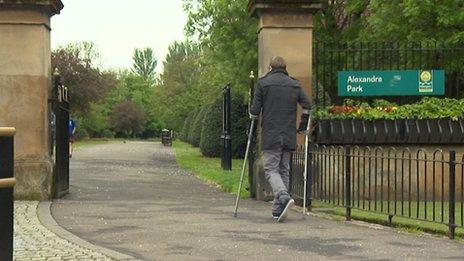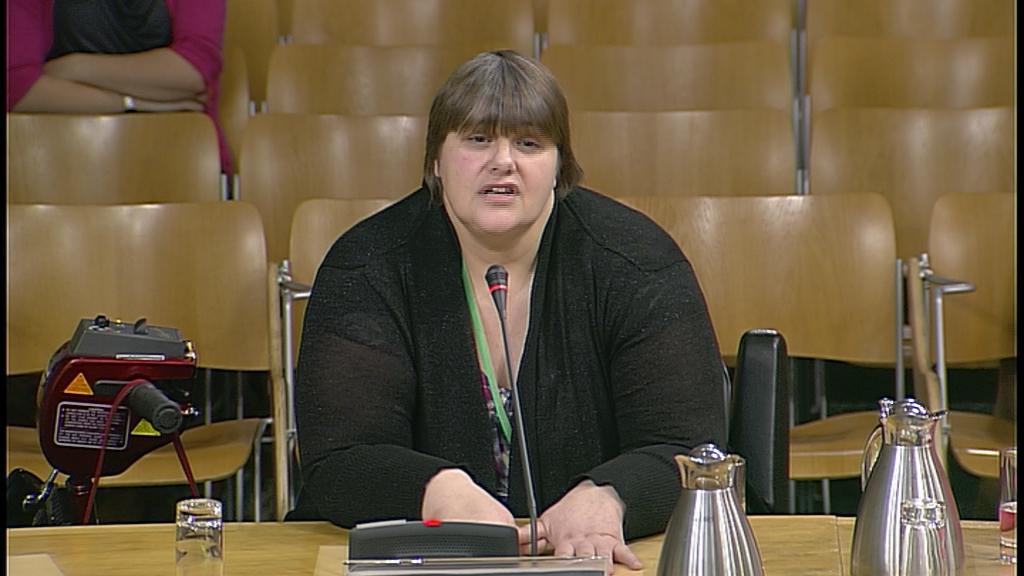NHS 'failing' to meet targets over chronic pain care
- Published
Chronic pain affects almost 800,000 people in Scotland
Some chronic pain sufferers are waiting nearly two years to access services, according to a report into NHS chronic pain care.
The report from Healthcare Improvement Scotland found that some patients waited 104 weeks to see a specialist.
The Scottish government said "substantial progress" had been made in treating chronic pain.
Chronic pain affects about 18% of the population, or 800,000 people in Scotland.
The condition is defined as pain which lasts for more than 12 weeks, despite treatment.
Report figures showed that patients waited an average of 30 weeks for treatment.
There were waits of up to 104 weeks to see a psychologist in the Borders, largely because there was no-one in the post for nearly a year.
Typically, patients across Scotland waited 30 weeks to see a psychologist, 10 weeks to see a hospital specialist and 26 weeks to see an expert in musculoskeletal conditions.
As well as the Scottish government target for treatment within 18 weeks, the 2011 Patient Rights (Scotland) Act also gave patients a legal right to inpatient or day-case treatment within 12 weeks. However, there is nothing patients can do if health boards breach these waiting times.
'Poorly resourced'
The report authors said long waits to see musculoskeletal specialists were especially concerning, since early treatment by one of these health professionals is known to reduce the risk of ongoing chronic pain.
The report also found services were patchy and poorly resourced. Four health boards had no dedicated physiotherapy service, four had no pain nurses and four had no pain psychologists, all contrary to NHS guidelines.
GPs had little involvement in chronic pain services and there was insufficient dialogue between health boards and patients or charities.
The authors also pointed out that if NHS guidelines were being followed, they would expect to see twice as many patients being referred for a specialised procedure called "spinal cord stimulation".
The Chairman of Action on Pain, Ian Semmons, said, despite 16 years of government reports, services had got worse.
"In Scotland a lot has been said, but nothing's been gained. Is this going to be another report which sits on the shelf and doesn't get acted on?"
"We've had a tremendous increase in calls to our helpline from Scotland over the last few years from people who just cannot get access to pain management."
Specialist centre
"There's no obligation for health boards to implement effective pain management services in their area," he said. "There should be a national policy, driven from the top."
The view was echoed by charity group, Pain Concern. The organisation's chairwoman Heather Wallace said: "It's depressingly true that pain services remain patchy and inequitable, waiting times can be long, and we need better access to psychology and spinal cord stimulation."
However she added that the report did offer something new: "For the first time there is a shared vision of what a good pain service looks like, and there are steps in place in every health board to drive forward change."
The Scottish government says services have improved. Health Secretary Alex Neil said "substantial progress" had been made to improve care, including an investment of £1.3m, as well as pain management programmes and a service model which all health boards will implement.
The Scottish government also confirmed that a new national centre for pain would be set up.
It will offer residential courses on how to cope with the effects of chronic pain and manage the condition. An announcement on the exact location for this centre is expected next month.
- Published29 May 2013

- Published8 January 2013
